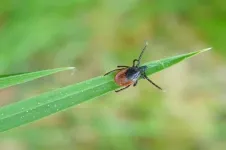Brain disease transmitted by tick bites may be treatable
2021-04-09
(Press-News.org) Tick-borne encephalitis is a disease just as nasty as it sounds. Once bitten by an infected tick, some people develop flu-like symptoms that resolve quietly but leave behind rampant neurological disease--brain swelling, memory loss, and cognitive decline. Cases are on the rise in Central Europe and Russia with some 10,000 incidents reported each year. Vaccines can provide protection, but only for a limited time. There is no cure.
Now a new study describes antibodies capable of neutralizing the virus transmitted by tick bites. These so-called broadly neutralizing antibodies have shown promise in preventing TBE in mice and could inform the development of better vaccines for humans. Further, preliminary results suggest that the antibodies may not only prevent tick-borne encephalitis but even treat the condition, as well as the related Powassan virus emerging in the United States.
Lead author Marianna Agudelo and colleagues in the laboratory of Rockefeller's Michel C. Nussenzweig examined nearly 800 antibodies obtained from individuals who had recovered from TBE or had been vaccinated to prevent infection. The most potent antibodies, designated VH3-48, turned out to be best suited to fend off future infections. They found that VH3-48 neutralized lab-grown varieties of the TBE virus, as well other tick-borne illnesses including the Langat, Louping ill, Omsk hemorrhagic fever, Kyasanur forest disease, and Powassan viruses.
The researchers also showed that these powerful antibodies are not common; in fact, most of the antibodies produced by humans exposed to TBE virus are of inferior quality, with the coveted VH3-48 antibodies making only occasional appearances. Moreover, vaccinated patients in the study did not manage to develop any VH3-48 antibodies at all. "You'd expect the most prevalent antibodies to be the absolute best, but that is not what we found in TBE," Agudelo says. "This may explain how the virus tricks the immune system, misdirecting it into producing inferior antibodies."
The discovery of VH3-48 provides hope for a more effective TBE vaccine. Current vaccines require three doses spaced over two years and only provide about five years of protection before a booster shot is required. Next-generation vaccines built around coaxing the body into producing the rare VH3-48 antibody could be more potent, require fewer booster shots, and also prove protective against a number of tick-borne viruses.
"A vaccine like this would not just be more elegant, but also better focused," says Michel C. Nussenzweig, the Zanvil A. Cohn and Ralph M. Steinman Professor and head of the Laboratory of Molecular Immunology at Rockefeller. "Now that we have the structures of these antibodies, we know what to target in order to design more effective vaccines."
Broadly neutralizing antibodies may also provide the first specific treatment for TBE. Nussenzweig, Agudelo, and colleagues found that mice infected with TBE recover after receiving antibody therapy, although it remains to be seen if this finding will translate to humans.
"The next step is a clinical trial with the antibodies," Nussenzweig says, "perhaps in Europe where there are many cases, to see whether we can ameliorate the symptoms of those suffering from encephalitis."
INFORMATION:
[Attachments] See images for this press release:

ELSE PRESS RELEASES FROM THIS DATE:
2021-04-09
Children may not be as infectious in spreading SARS-CoV-2 to others as previously thought, according to new University of Manitoba-led research in CMAJ (Canadian Medical Association Journal).
"Our findings have important public health and clinical implications," writes principal investigator Dr. Jared Bullard, associate professor, pediatrics/child health and medical microbiology/infectious diseases, Max Rady College of Medicine, University of Manitoba and associate medical director, Cadham Provincial Laboratory in Winnipeg, Manitoba. "If younger children are less capable of transmitting infectious virus, daycare, in-person school and cautious extracurricular activities may be safe to continue, with appropriate precautions in place, ...
2021-04-09
When setting SARS-CoV-2 vaccine priorities, Canada should take a more nuanced approach that considers geographic and occupational risk exposures, as 75% of Canadian adults have at least 1 risk factor for severe COVID-19, argues an analysis in CMAJ (Canadian Medical Association Journal).
"Using risk factors for severe COVID-19 in a strategic vaccination strategy may not offer much refinement because of how widespread these conditions are. More detailed weighting of medical, geographic and occupational risks might be required if vaccination is constrained," writes Dr. Finlay McAlister, Faculty of Medicine & Dentistry, University of Alberta, Edmonton, Alberta, with coauthors. "In particular, since the third wave of the COVID-19 pandemic appears ...
2021-04-09
Excessive CO2 emissions are a major cause of climate change, and hence reducing the CO2 levels in the Earth's atmosphere is key to limit adverse environmental effects. Rather than just capture and store CO2, it would be desirable to use it as carbon feedstock for fuel production to achieve the target of "net-zero-emissions energy systems". The capture and conversion of CO2 (from fuel gas or directly from the air) to methane and methanol simply using water as a hydrogen source under ambient conditions would provide an optimal solution to reduce excessive CO2 ...
2021-04-09
BOSTON -- Videos of people experiencing severe neurological symptoms, including convulsions and difficulty walking, purportedly after receiving a COVID-19 vaccine, have surfaced on Facebook, YouTube and other social media channels. The millions of people watching these videos might conclude that the vaccine is either quite dangerous to produce such symptoms or that the people in the videos are faking their symptoms. Both conclusions are incorrect, according to neurologist and psychiatrist David Perez, MD, MMSc, director of the Functional Neurological Disorders Unit at Massachusetts General Hospital (MGH).
In a JAMA Neurology Viewpoint, the authors explain that the COVID-19 vaccine may precipitate the development of functional neurological disorder (FND), a neuropsychiatric disorder with ...
2021-04-09
Study: "How Do Weighted Funding Formulas Affect Charter School Enrollments?"
Author: Paul Bruno (University of Illinois at Urbana-Champaign)
This study was presented today at the American Educational Research Association's 2021 Virtual Annual Meeting.
Main Findings:
The adoption of a school funding system in California that increased revenues for schools enrolling higher-need students led to an increase in the rate at which charter schools enrolled low-income students.
This effect was concentrated among charter schools initially enrolling low-income students at relatively low rates, suggesting that some charters "cream skim" high achieving, wealthier students, but that such behavior also can be mitigated.
Details:
For many, the expansion of charter schooling since the early ...
2021-04-09
It's time for a more nuanced approach to vaccine prioritization, as more contagious COVID-19 variants become prevalent and a third wave of infections threatens to overwhelm hospitals in some provinces, according to an END ...
2021-04-09
Over the past decade, the CRISPR-Cas9 gene editing system has revolutionized genetic engineering, allowing scientists to make targeted changes to organisms' DNA. While the system could potentially be useful in treating a variety of diseases, CRISPR-Cas9 editing involves cutting DNA strands, leading to permanent changes to the cell's genetic material.
Now, in a paper published online in Cell on April 9, researchers describe a new gene editing technology called CRISPRoff that allows researchers to control gene expression with high specificity while leaving the sequence of the DNA unchanged. Designed by Whitehead Institute Member Jonathan Weissman, University of California San Francisco assistant professor Luke Gilbert, Weissman lab postdoc James Nuñez and collaborators, ...
2021-04-09
What The Study Did: This survey study examines wh0 U.S. adults believe should be prioritized for access to COVID-19 vaccines.
Authors: Ezekiel J. Emanuel, M.D., Ph.D., of the University of Pennsylvania Perelman School of Medicine in Philadelphia, is the corresponding author.
To access the embargoed study: Visit our For The Media website at this link https://media.jamanetwork.com/
(doi:10.1001/jamanetworkopen.2021.7943)
Editor's Note: The article includes conflict of interest and funding/support disclosures. Please see the article for additional information, including other authors, author contributions and affiliations, conflict of interest and financial disclosures, and funding and support.
INFORMATION:
Media advisory: The ...
2021-04-09
What The Study Did: In this observational study, data are used to assess the association of demographic and clinical characteristics with severe COVID-19 illness among hospitalized U.S. pediatric patients with COVID-19.
Authors: Alyson B. Goodman, M.D., of the COVID-19 Response Team at the Centers for Disease Control and Prevention in Atlanta, is the corresponding author.
To access the embargoed study: Visit our For The Media website at this link https://media.jamanetwork.com/
(doi:10.1001/jamanetworkopen.2021.5298)
Editor's Note: Please see the article for additional information, including other authors, author contributions and affiliations, conflict ...
2021-04-09
What The Study Did: Genome analysis was performed on SARS-CoV-2 RNA from seven patients in a long-term care facility who were asymptomatic at the time of screening.
Authors: Baha Abdalhamid, M.D., Ph.D., of the University of Nebraska Medical Center in Omaha, is the corresponding author.
To access the embargoed study: Visit our For The Media website at this link https://media.jamanetwork.com/
(doi:10.1001/jamanetworkopen.2021.7939)
Editor's Note: The article includes conflicts of interest and funding/support disclosures. Please see the article for additional information, including other authors, author contributions and affiliations, conflict of interest and financial disclosures, and funding and support.
INFORMATION:
Media ...
LAST 30 PRESS RELEASES:
[Press-News.org] Brain disease transmitted by tick bites may be treatable



